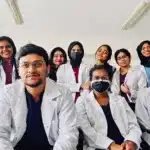Pursuing a medical education in the Caribbean represents a unique opportunity for students worldwide. With its diverse range of medical programs, the Caribbean offers an alternative path to those seeking to enter the field of medicine. This article delves into the various facets of Caribbean medical education, from understanding the educational landscape to financial planning, clinical experience, and the strategic advantages of studying in places like Grenada. The key takeaways provide a concise overview of the essential points to consider when exploring medical education options in the Caribbean.
Key Takeaways
- Caribbean medical schools provide an alternative route to becoming a doctor, with programs recognized in the U.S. and U.K., potentially offering a faster and less rigorous entry compared to direct admission in those countries.
- The cost of medical programs in the Caribbean may be higher than some options in India, but they offer superior international exposure and a higher potential return on investment in the global medical field.
- Safety and support for international students are prioritized in Caribbean medical schools, ensuring a secure learning environment with necessary mental health and cultural integration resources.
- Clinical rotations in the Caribbean can take place in prestigious hospitals in the U.S. and U.K., providing diverse clinical exposure and contributing to high USMLE pass rates.
- Admissions to Caribbean medical schools are merit-based and transparent, without reliance on management quotas, and there is comprehensive support for students wishing to return and practice in India.
Understanding the Caribbean Medical Education Landscape

Overview of Medical Programs
The Caribbean region offers a variety of medical programs catering to a diverse group of students. These programs range from traditional 4-year MD programs to alternative routes like the BS/MD and Premed/MD programs, which can accommodate students at different educational stages. Financial considerations are paramount, as the costs can be substantial, but the potential return on investment is significant due to enhanced career prospects.
Medical schools in the Caribbean are known for their multicultural learning environments and personalized mentorship. Elective rotations and specialized training programs provide exposure to various medical specialties, fostering individualized learning and career guidance. It’s crucial for students to understand the cost structures and explore all available resources for funding their education.
By considering alternative pathways, students can tailor their medical education to align with their career goals and personal circumstances.
The list of medical schools in the Caribbean is extensive, with institutions like the Washington University of Barbados School of Medicine, established in 2016, offering diverse and comprehensive clinical exposure. Prospective students should research each program’s accreditation, curriculum, and clinical rotation opportunities to make an informed decision.
Admission Criteria and Processes
The journey to a medical career in the Caribbean begins with understanding the admission criteria and processes of your chosen institution. Prospective students must navigate a series of steps, from submitting an application complete with academic transcripts and passport copies to proving English proficiency, if required. A critical component is the eligibility criteria, which often includes a minimum age requirement and educational prerequisites such as a Bachelor’s degree or equivalent credits.
Eligibility Criteria:
- Minimum age of 18 upon arrival
- Bachelor’s degree or at least 90 undergraduate credits
The admission process is a gateway to global education opportunities, and understanding it is essential to your success.
Financial considerations, such as the ability to cover tuition and living expenses, are also examined during the admissions process. Students must be prepared to provide financial documents and obtain a student visa, which involves additional steps like securing medical insurance and other relevant paperwork.
Comparing Caribbean Schools with Global Standards
When considering medical education in the Caribbean, it’s essential to compare the regional schools with global standards. Caribbean medical schools are recognized for their ability to prepare students for medical careers in the US and Canada, offering programs that align with North American curricula. These institutions often feature experienced faculty and provide opportunities for clinical rotations in the US and UK, which are crucial for residency placements.
GPA and MCAT scores are standard admission requirements, reflecting an applicant’s academic ability and potential. Here’s a brief comparison of GPA requirements across various Caribbean medical schools:
| School | Minimum GPA Requirement |
|---|---|
| School A | 3.0 |
| School B | 3.2 |
| School C | 2.8 |
Financial considerations are also paramount, with many schools offering scholarships and financial aid to support students. The cost of education in the Caribbean is often lower than in countries like the USA or UK, making it an attractive option for many.
By leveraging the collective expertise and experience of a global network, individuals can navigate the complexities of the medical profession with greater confidence and strategic foresight.
Financial Planning for Medical Studies in the Caribbean

Program Cost and Budgeting
When considering medical studies in the Caribbean, a critical aspect is understanding the financial requirements and creating a viable budget. Tuition fees for medical programs can vary significantly, and when combined with living expenses, the total cost can be substantial. Here’s a snapshot of the average annual tuition fees for international students:
| Level of Study | Tuition Fee Range (USD) |
|---|---|
| Undergraduate | $8,000 – $40,000 |
| Postgraduate | $10,000 – $60,000 |
| Doctoral | $28,000 – $55,000 |
Living expenses, books, and insurance are additional costs that must be factored into your budget. It’s essential to research and account for these when planning your finances.
Creating a comprehensive budget that includes tuition, accommodation, food, transportation, and other personal expenses is essential. This financial planning will help in making informed decisions about which schools to apply to and how to manage finances throughout the medical program.
Financial aid, such as scholarships and loans, can provide relief to students facing economic challenges. Early research and application for these opportunities are crucial, as they can be highly competitive. Utilize resources like university financial aid offices and online databases to find scholarships tailored to your needs.
Scholarship and Funding Opportunities
Securing financial aid is a critical step for students aiming to study medicine in the Caribbean. Scholarships and financial aid can significantly reduce the burden of high tuition fees and living expenses. It’s important to start researching early, as many scholarships have strict deadlines and require detailed applications.
Types of Financial Aid Available:
- Need-based scholarships
- Merit-based scholarships
- College-specific scholarships
- Country-specific scholarships
Financial planning is not just about covering costs, but also about exploring opportunities for scholarships and financial aid to ease the burden. By thoroughly estimating the costs and exploring financial aid options, students can take a step closer to realizing their medical education goals in the Caribbean.
Financial constraints are real, but so are scholarships. Many students miss out on available financial aid because they don’t look for it or assume they won’t qualify.
Cost Comparison with India and Other Countries
When considering the pursuit of a medical degree in the Caribbean, a critical factor is the cost comparison with India and other countries. The Caribbean medical schools offer competitive tuition fees, often lower than those in the US or UK, making them an attractive option for many students. For instance, the cost of an MBBS course in the Caribbean ranges from US$ 3,500 to US$ 4,800 per semester, which can be a more feasible option for those looking to study medicine abroad.
In contrast, studying medicine in India can be highly competitive and expensive, with parents spending a significant portion of their income on education. The cost of medical education in the US, for example, can reach up to a crore per year in tuition fees alone. This stark difference in costs necessitates a thorough financial analysis for students and their families.
While the initial program costs in the Caribbean might appear higher compared to some Indian options, the long-term benefits such as faster routes to becoming a doctor and superior international exposure should be considered.
It is also important to factor in the cost of living, which can vary greatly between countries. Additional expenses such as flights, accommodation, and daily living costs can add up, making it essential to plan comprehensively. Investing in foreign stocks or international equity funds can be a strategic move to counteract currency fluctuations and secure finances in a more stable currency.
Ultimately, the decision to study medicine in the Caribbean versus India or another country should be based on a combination of cost-effectiveness, educational quality, and long-term career goals. Prospective students should conduct detailed research and consult with educational advisors to make an informed decision.
Clinical Experience and Residency Prospects

USMLE Pass Rates and Guarantees
The United States Medical Licensing Examination (USMLE) is a pivotal step for medical graduates aiming to practice in the U.S. High USMLE pass rates are often highlighted by Caribbean medical schools as a testament to the quality of their programs. Avalon University School of Medicine, for example, recently celebrated a 100% pass rate for USMLE Step 2 CK in the first quarter, underscoring their commitment to student success.
A focused approach to USMLE preparation is essential, involving comprehensive review courses, access to question banks, and regular practice tests. While some institutions may offer guarantees, it is important to understand that the USMLE is a challenging exam and outcomes can vary. Students should seek programs that provide personalized tutoring and continuous feedback to best support their exam preparation.
It is essential to strategically plan each step of the journey, from passing the USMLE to securing a residency spot. The competition is fierce, and the expectations are high, but with the right approach, international students can achieve their MD dreams in America.
Clinical rotations play a crucial role in USMLE preparation, offering hands-on experience in the U.S. healthcare system. Caribbean MD schools offer strategic advantages for Indian students pursuing a US medical career, including USMLE preparation, clinical rotation support, and dual placement opportunities for international careers.
Clinical Rotation Locations
Clinical rotations are a critical component of medical education, providing students with the opportunity to apply their knowledge in real-world healthcare settings. Choosing the right location for clinical rotations can significantly influence a medical student’s education and future career prospects. Medical colleges in the USA often have partnerships with top hospitals and clinics to facilitate these rotations, offering guidance and support throughout the process.
Clinical Rotation Support Provided by Medical Colleges in the USA:
- Guidance on selecting appropriate rotations
- Assistance with application and documentation
- Orientation programs to acclimate to the clinical environment
- Continuous support and mentorship throughout the rotation
The flexibility to complete clerkships in various countries allows students to tailor their clinical experiences to their interests and career goals.
It’s important for students to research and select programs that not only provide robust clinical rotation support but also align with their long-term career aspirations. The pursuit of an MD degree in the United States, for instance, offers the possibility of dual placement opportunities, broadening professional horizons and providing a global edge.
Navigating Licensing and Residency Placement
Transitioning from medical school to a residency program is a critical step for Caribbean medical graduates. The process involves understanding the specific licensing requirements and residency application procedures of the target country. Securing a residency position is highly competitive, and success is influenced by factors such as USMLE scores, letters of recommendation, and the overall strength of the candidate’s application.
For many international medical graduates (IMGs), the Electronic Residency Application Service (ERAS) is the portal through which applications are submitted. It is essential to prepare a comprehensive ERAS application, which includes the personal statement, medical school transcripts, and letters of recommendation. Match A Resident has assisted thousands of Caribbean IMG applicants through the residency application process year after year, providing valuable guidance on ERAS Application preparation.
By leveraging the collective expertise and experience of a global network, individuals can navigate the complexities of the medical profession with greater confidence and strategic foresight.
Here are some steps to consider when planning for residency:
- Acquire knowledge of the medical licensing exams for different international countries.
- Gain hands-on clinical experience through rotations in well-equipped hospitals.
- Build a strong profile with research publications and relevant medical certifications.
- Prepare for cultural and academic differences in medical education systems.
Safety and Support for International Students

Campus Safety Measures
Ensuring the safety of students is a paramount concern for Caribbean medical schools. Robust security protocols are in place to protect the well-being of the international student community. These measures include 24/7 campus security, surveillance systems, and strict access controls to ensure a secure learning environment.
- Campus security personnel are trained to handle a variety of situations, providing peace of mind for students and their families.
- Emergency response plans are regularly updated and practiced to prepare for any unforeseen events.
- Support services are available to assist students in distress, offering both immediate aid and long-term resources.
The commitment to student safety extends beyond physical measures, encompassing mental health and emotional support systems to foster a holistic approach to student well-being.
Mental Health and Wellbeing Support
The pursuit of a medical degree is a rigorous and demanding journey, and maintaining mental health and wellbeing is crucial for success. Caribbean medical schools recognize the importance of supporting their students’ psychological needs and offer a range of services to promote resilience and wellbeing.
- Support Services: Universities provide dedicated services to assist with academic challenges, cultural adaptation, and personal well-being.
- Peer Networks: Engaging with fellow students can lead to shared learning experiences and emotional support.
- Professional Associations: Membership in medical associations can offer valuable resources and networking opportunities.
By leveraging these support networks, students can enhance their academic performance, foster personal growth, and build lasting professional relationships.
Financial considerations, such as scholarships and aid, are also part of the support landscape. Students should proactively seek out financial resources to manage the costs of education and living abroad. Additionally, understanding the local language and culture is imperative for effective communication and integration into the healthcare system of the host country.
Community and Cultural Integration
The journey of studying medicine in the Caribbean extends beyond the classroom, offering a rich tapestry of cultural experiences that contribute to both personal and professional growth. Engaging with the local community and fellow international students allows for a deeper understanding of diverse healthcare practices and patient interactions. This cultural integration is not only enriching but also essential for developing the cross-cultural competence required in today’s globalized healthcare environment.
To facilitate this integration, many institutions provide support systems designed to help students navigate the complexities of a new cultural landscape. These may include:
- Orientation programs to introduce students to the local culture and customs.
- Language courses to bridge communication gaps and foster better understanding.
- Social events and community service opportunities to encourage interaction and build networks.
By actively participating in these initiatives, students can enhance their adaptability and empathy, crucial traits for any medical professional.
Furthermore, the benefits of such engagement are manifold, leading to improved healthcare outcomes and stronger collaborative efforts in global health initiatives. Students are encouraged to embrace these opportunities, as they lay the groundwork for a successful and culturally competent medical career.
Strategic Advantages of Studying Medicine in Grenada

Choosing Grenada Over Direct U.S./U.K. Admission
Grenada presents a compelling alternative for students who face the daunting competition and stringent entry requirements of U.S. and U.K. medical schools. Opting for Grenada’s medical programs can be a strategic move, offering an accelerated path to a medical degree with recognized quality education. The island’s medical schools have tailored their curricula to align with international standards, ensuring that graduates are well-prepared for global practice.
Financial considerations are also paramount. While the costs can be substantial, the potential return on investment is equally significant, given the enhanced career prospects and earning potential. Scholarships and financial aid play a crucial role in supporting students through this journey.
The decision to study medicine in Grenada should be informed by careful consideration of long-term career goals and the unique opportunities available.
The table below highlights the key differences between pursuing medical education in Grenada versus direct admission to U.S./U.K. schools:
| Factor | Grenada | U.S./U.K. |
|---|---|---|
| Entry Requirements | More accessible | More stringent |
| Program Duration | Often accelerated | Standard length |
| Cost | Competitive with scholarships | Typically higher |
| Global Recognition | U.S./U.K. equivalent degrees | Established prestige |
| Clinical Experience | Diverse international rotations | Location-specific |
By understanding the nuances of the Caribbean medical education landscape, students can make informed decisions that align with their aspirations and resources.
Returning to Practice in India
Graduates from Caribbean medical schools who wish to return and practice in India must navigate a series of regulatory requirements. The most critical step is passing the Foreign Medical Graduate Examination (FMGE), which is mandatory for all Indian nationals with a foreign medical degree. The FMGE, conducted by the National Board of Examination (NBE), assesses an individual’s readiness to practice medicine in India.
To further assist graduates, here is a simplified list of steps to follow:
- Obtain your medical degree from a recognized Caribbean institution.
- Ensure your degree is equivalent to the Bachelor of Medicine in India.
- Apply for the FMGE and prepare thoroughly for the examination.
- Upon passing, complete the mandatory internship in India.
- Finally, register with the National Medical Council (NMC) to legally practice medicine.
Success in the FMGE is not guaranteed, and the exam is known for its rigorous standards. However, with adequate preparation and understanding of the requirements, graduates can achieve their goal of practicing medicine in India.
Management Quota Clarification
In addressing concerns regarding the management quota, it is essential to clarify that our medical programs in the Caribbean prioritize merit and a comprehensive evaluation of each candidate. Admissions are not influenced by management quotas, ensuring a level playing field for all applicants.
Eligibility and admission integrity are at the core of our process. We maintain transparency and fairness, which are crucial for upholding the quality and reputation of our institutions. The following points outline our stance on management quota:
- Admissions based solely on merit and candidate profile
- No management quota to bypass standard admission criteria
- Commitment to equal opportunity for all applicants
Our dedication to merit-based admissions reinforces the value we place on academic excellence and equitable access to medical education.
Caribbean medical schools offer unique opportunities with strategic application planning, financial considerations, and global networking. Diverse career prospects and early preparation are key for success.
Embarking on a medical career is a significant decision, and choosing the right path can set the foundation for success. Studying medicine in Grenada offers a strategic advantage with a Fast-Track MD Pathway that bypasses traditional hurdles like the MCAT and NEET, providing a direct route to becoming a US-qualified doctor. With a 97x higher success rate and a 100% admission guarantee, this pathway is not just a dream but a tangible reality. Don’t let financial constraints deter you; scholarships are available to make this affordable education pathway accessible. Take the first step towards a rewarding medical career by visiting our website and discovering how we can guide you through the MD Pathway. Your future as a US-qualified doctor is just a click away!
Conclusion
In conclusion, pursuing medicine in the Caribbean emerges as a compelling option for aspiring doctors seeking quality education with international recognition. The journey to becoming a medical professional through Caribbean medical schools is marked by a blend of rigorous academic training, diverse clinical experiences, and opportunities for global practice. Despite the challenges of navigating admissions, managing finances, and meeting licensing requirements, the rewards of cultural immersion, personal growth, and career advancement are significant. Students are encouraged to thoroughly research and consider the unique features, safety measures, and financial implications of their chosen programs. With strategic planning and dedication, studying medicine in the Caribbean can unlock doors to a fulfilling and internationally-oriented medical career.
Frequently Asked Questions
What are the admission criteria for Caribbean medical schools?
Admission criteria for Caribbean medical schools typically include a bachelor’s degree, GPA, MCAT scores, language proficiency tests (IELTS, TOEFL), required coursework, clinical experience, personal qualities, and extracurricular activities.
Can I practice medicine in India after studying in the Caribbean?
Yes, you can practice medicine in India after studying in the Caribbean by obtaining the necessary qualifications and following the procedures for a smooth transition to practicing medicine in India.
How do the costs of Caribbean medical programs compare with those in India?
Caribbean medical programs might be more expensive than some options in India, but they offer a faster route to becoming a doctor, with international exposure and higher potential ROI in the global medical field.
Are there scholarships or funding opportunities for medical studies in the Caribbean?
Yes, Caribbean medical schools often offer financial aid and scholarship opportunities to help support international students.
What is the USMLE pass rate for Caribbean medical students?
Caribbean medical schools pride themselves on high USMLE pass rates for Step 1 and Step 2, although no program can guarantee a 100% pass rate.
Is safety a concern for international students studying medicine in the Caribbean?
Safety is a top priority for Caribbean medical schools, and they ensure a secure and supportive environment for students, with necessary safety measures in place.














